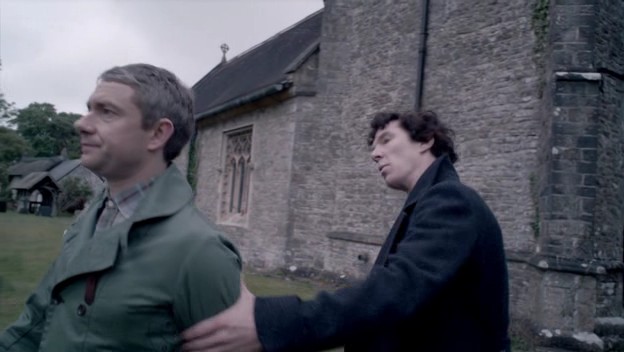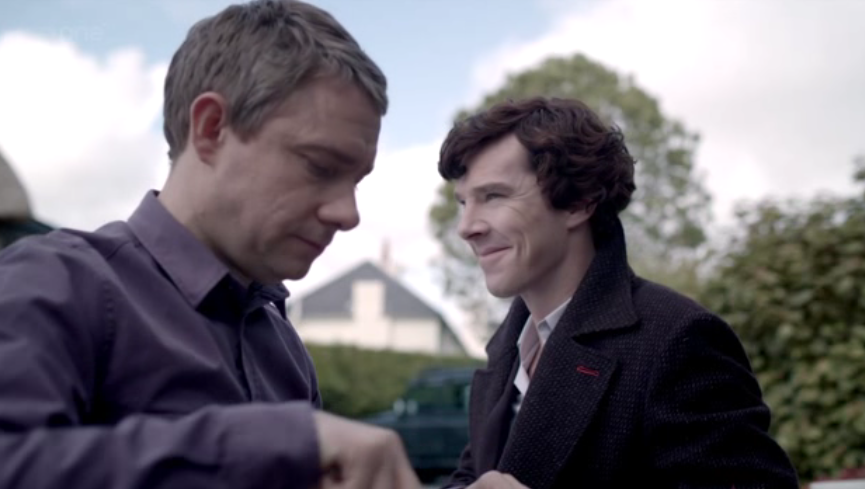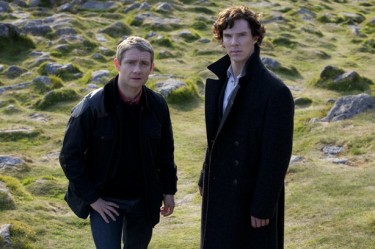
In The Hounds of Baskerville Sherlock has worked his way through all available cases and, without a puzzle to solve, he’s jonesing for a cigarette, which no one will give him. His only potential client is a little girl who’s lost her bunny, Bluebell. “A rabbit, John! Ah, wait, but there’s more. Before it disappeared, it turned luminous, ‘like a fairy,’ according to little Kirsty. Disappeared from a locked hutch, no sign of forced entry… What am I saying? This is brilliant! Phone Lestrade, tell him there’s an escaped rabbit.” Yeah, he’s kidding. Mercifully the doorbell rings and an adult client appears, or so we think. Henry Knight is more a manchild. He’s being haunted by a recently revived local legend of a hellhound running loose on the moors, right where his father died twenty years ago—the victim of a vicious dog. Or so Henry recalls, having been with his father at the time of his death. Sherlock is unimpressed until Henry insists on what he saw the night before, “They were the footprints of a gigantic hound!” Suddenly, he’s on the case. Well, he’s putting his ‘best man’ on it, being far too busy to go himself.
“What’re you talking about, you’re busy? You don’t have a case! A minute ago you were complaining—” says Watson.
“Bluebell, John! I’ve got Bluebell, the case of the vanishing glow-in-the-dark rabbit. NATO’s in an uproar,” says Sherlock, who then makes yet another about face and decides to go along. “Twenty-year-old disappearance? A monstrous hound? I wouldn’t miss it for the world!”
I’m not going to get too involved in divergences from the original this time—Henry is the son and heir of his estate rather than a distant cousin turning up to claim his inheritance, Baskerville is a secretive military base instead of that estate, Sherlock is involved throughout the case rather than watching from afar—these being largely incidental adjustments. The crux of the matter is the same, things are happening that simply cannot be real and the why is integral to uncovering the who and how.
They start their investigation sizing up the hollow where Henry’s father died and then they infiltrate Baskerville, with the aid of Mycroft’s pilfered ID. Sherlock knows he only has minutes before the ruse is up and in short order the two of them intimidate their way into the labs where the animal related experiments are conducted. Sherlock interrogates one of the scientists, who admits very little, and then demands, “Why did Bluebell have to die, Dr. Stapleton?” He only gets denials, but his time is running out and the goal becomes getting out of the building before Mycroft can drop the hammer on them. All the while Watson is thoroughly confused, “Did we just break in to a military base to investigate a rabbit?” They get to the elevator before the base is on alert, but as the doors open alarms are going off and the guys with guns are looking twitchy. At the last moment a friendly looking scientist of some esteem, Dr. Franklyn, vouches for Sherlock actually being Mycroft and they are released.
“Don’t worry,” says Dr. Franklyn, “I know who you really are. I’m never off your website. Thought you’d be wearing the hat though.”
“That wasn’t my hat,” says Sherlock.
“I hardly recognize him without the hat,” says Dr. Franklyn to Watson.
“Wasn’t my hat,” Sherlock insists.
Franklyn knows young Henry, was a colleague of his father’s, and offers to be as helpful as he can, official secrets act and all. But Sherlock has obviously observed something that the rest of us have not. He has that look, that air of confidence, as if he’s just about got the puzzle solved.
“Can we please not do this this time?” Watson asks.
“Do what?”
“You being all mysterious with your—cheekbones. And turning your coat collar up so you look cool.”
“I don’t do that,” says Sherlock.
“Yeah you do.”
Next they decide to take Henry out on the moor at night to see if they can get a look at the legendary dog. He becomes hysterical and insists he saw the hound, insists Sherlock saw it too. Back at Henry’s house, Sherlock denies it and Watson gives Henry a sedative. They return to their inn, but Sherlock looks deeply disturbed. “I saw it too, John,” he confesses, “a hound out there in the hollow—a gigantic hound.” He’s shaking and gulping down Scotch, presumably, while Watson urges him to focus on the facts. “Once you’ve ruled out the impossible whatever remains, however improbable, must be true,” he tells Watson, as if he’s stumbled upon his salvation. But his reassured calm is fleeting. His hands are shaking—he is afraid—and he’s just as distressed by that fact as he is by the fear itself. He tries to do as he is advised, reciting all he observes around them like a maniac, completely alienating Watson in the process—even claiming that he doesn’t have friends.
The next day Sherlock seems himself again, manically so. He’s had time to think and clearly he’s got theories bouncing around in that big brain. He intends to make clear to Watson the things he had said the night before. He was in doubt of everything, including his own faculties, but there’s more.

“Listen, what I said before, John, I meant it. I don’t have friends. I’ve just got one.” He never really intends to be terrible and here you get the feeling he’s not trying to be sweet either, just clear. But what a moment.
My favourite scene from the original includes an exchange between Holmes and Watson that I immediately recognized as the most back-handed compliment of all time. Watson makes some or other irrelevant remark and Holmes says, “It may be that you are not yourself luminous, but that you are a conductor of light. Some people without possessing genius have a remarkable power of stimulating it.” And, to my delight, it is well represented in the updated version.

“John? John! You are amazing, you are fantastic!” says Sherlock out of nowhere.
“Yes, alright, don’t overdo it,” says Watson.
“You’ll never be the most luminous of people, but as a conductor of light, you’re unbeatable!”
“Cheers. What?” Watson asks, realizing the meaning of Sherlock’s words is far less grandiose than his choice of phase.
“Some people who aren’t geniuses have an amazing ability to stimulate it in others.”
“Hang on, you were saying sorry a minute ago, don’t spoil it,” Watson says. “Go on, what have I done that’s so bloody stimulating?”
Then, just as he’s about to explain his theory he notices Lestrade in the pub. And he’s furious.
“Oh, this is Mycroft, isn’t it?”
“Oh, look…” says Lestrade.
“Oh, of course it is. One mention of Baskerville and he sends down my handler to spy on me incognito,” Sherlock says. “Is that why you’re calling yourself Greg?”
“That’s his name,” says Watson.
“…Is it?” asks Sherlock.
“Yes, if you’d ever bothered to find out,” says Lestrade. “Look, I’m not your handler and I don’t do what your brother tells me.”
We don’t get a final word on what brought Lestrade in on the case and in fact he does very little once he’s there. (Of course I’m always happy to see Rupert Graves.) With the mention of Scotland Yard, and very little effort, he gets the proprietors at the inn to admit to cooking up the hellhound legend as to draw in tourists. But they lose control of the dog and he runs off, now a real danger lost out on the moors. In the midst of their confession Sherlock makes Watson a coffee, though not black as he usually takes it, and shows unusual concern for his enjoyment of it. Later, on his own with Lestrade, Watson assures him that Sherlock is actually glad to see him.
“I suppose he likes having all the same faces back together. Appeals to his…his…” says Lestrade.
“Asperger’s?” suggests Watson.
They head back to Baskerville, with Mycroft’s help this time. Sherlock deals with the brass while Watson heads to Dr. Stapleton’s lab to look for the hound, but he winds up exposed to a series of trials subjecting him to incredibly loud noise, bright lights, darkness, and finally the sound of a wild dog. He’s absolutely terrified that he’s succeeded in finding the dog by way of it hunting him down. Then all of a sudden Sherlock is there and there’s no sign of a dog anywhere.
Together they find Dr. Stapleton and Sherlock gets tough with her this time. “Will you tell little Kristy what happened to Bluebell or shall I?” he asks. She admits that one of the experimental rabbits got mixed up with her daughter’s pet. Sherlock is convinced they’ve all been drugged into the delusion of seeing the hound and Stapleton lets him examine the elements of her experiment, but he cannot figure out what they’re using as a drug.
“Get out,” says Sherlock. “Get out. I need to go to my mind palace.”
“His what?” asks Dr. Stapleton.
“His mind palace? It’s a memory technique,” says Watson. “A sort of mental map…It doesn’t have to be a real place. You deposit memories there and theoretically you can never forget anything. All you have to do is find your way back to it.”
“So this imaginary location could be anything? A house or a street?” she asks.
“Yeah.”
“But he said ‘palace’. He said it was a palace.”
“Yeah well, he would, wouldn’t he?” says Watson.
We see him sorting through the notations in his grey matter, again with elegant graphics, but he still can’t figure out exactly how the delusion is enacted so vividly. So he cheats. They make their way to the office of Belvedere, the martinet leader of the base, and through observing his books and the décor in his office Sherlock cracks his computer password and finally gets to the bottom of the fear stimulus experiments at Baskerville.
Meanwhile back on the moor Henry is both afraid of and looking for the hound, gun in hand. They catch up with him and he’s hysterical. Sherlock insists he remember what he saw when he was a boy and his father was attacked. “It wasn’t a monster was it? It was a man.” Right. And Lestrade shoots the actual dog. Fine. But we were never really that interested in the answers as much as how Sherlock was going to find them.
The real treat of this episode, much like the second episode of the first season, is…well…the bromance. There, I said it. I apologize. This story is far more interesting than The Blind Banker, but the crime isn’t really that compelling. We keep watching because we love seeing Sherlock and Watson play so perfectly off of each other. Like at the end when Watson realizes Sherlock wasn’t being thoughtful getting him that coffee the day before.
“You thought it was in the sugar. You were convinced it was in the sugar. Oh god, it was you!” Watson says, putting it all together. “You locked me in that bloody lab.”
“I had to,” says Sherlock, “It was an experiment.”
“But it wasn’t in the sugar. So you got it wrong.”
“No.”
“You were wrong. It wasn’t in the sugar. You got it wrong.”
“A bit. It won’t happen again.”

Obviously I was happier for having Lestrade along for the ride, but what I understand now about my extreme satisfaction with this episode is that while everyone else crows over Benedict Cumberbatch (and his cheekbones) Martin Freeman is my preferred Watson. No qualifier. He’s the best there ever was. And it’s not just how well they’ve written the part, it’s the performance. He’s clever and embarrassed and resentful and frustrated and flirtatious and, every once in a while, smug in the perfect way. He is amazing. And I wouldn’t be half the fan I am if anyone else played the part.

